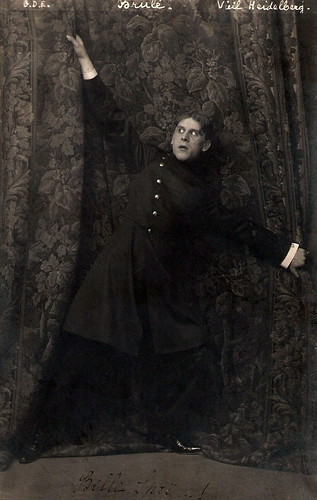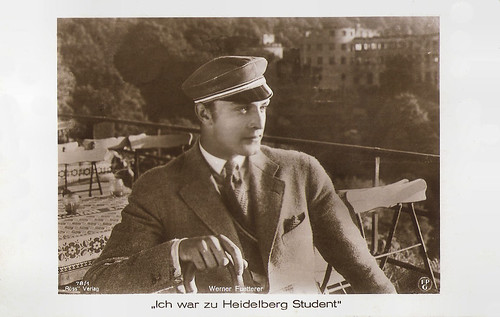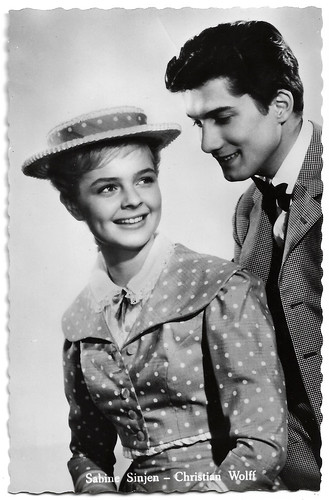On stage

Dutch postcard, ca. 1902. Photo: Schotel, Rotterdam. The Dutch stage actor Henri (D.H.) Brondgeest as Karl Heinrich in the play 'Oud Heidelberg' (Old Heidelberg/ Alt-Heidelberg) by Wilhelm Meyer Förster. Henri Brondgeest (1865-1928) performed in this play in the season 1902/1903, with the N.V. Het Rotterdamsch Tooneelgezelschap acting under the direction of Louis Moor.

Swedish postcard by Axel Eliassons Konstförlag, no. 1484. Photo: Svenska Teatern, 1903. Anders de Wahl and Astrid Torsell in the play 'Gamla Heidelberg' (Alt Heidelberg/Old Heidelberg). The play was first performed in Sweden in 1903. De Wahl would play the lead of Prince Carl Heinrich several times. After him, Gösta Eckman would play the part often too.

Swedish postcard by Axel Eliassons Konstförlag, Stockholm. Photo: Svenska Teatern, 1903. Anders de Wahl and Astrid Torsell in the play 'Gamla Heidelberg' (Alt Heidelberg/Old Heidelberg).

Belgian postcard by G.D.E. (G. Dupont-Emera, Bruxelles). André Brulé in the play Vieil Heidelberg (Old Heidelberg). Sent by mail in Belgium in 1908. Around 1908, Brulé must have made a large photo shoot at G. Dupont-Emera's photo studio in Brussels, as many cards with him exist published by G.D.E.

Belgian postcard. Photo by G.D.E. (G. Dupont-Emera, Rue Royale 142, Bruxelles). André Brulé in the play 'Vieil Heidelberg'.

Belgian postcard by G.D.E., Bruxelles. The card was sent by mail in 1909. André Brulé in the play 'Vieil Heidelberg' (Old Heidelberg/Alt Heidelberg) (1906).

Swedish postcard by Axel Eliassons Konstförlag, Stockholm, no. 31. Photo: Hofatelier Jager, 1917. Gösta Ekman and Tora Teje in the stage play 'Gamla Heidelberg' (Old Heidelberg/The Student Prince in Old Heidelberg).
The Prince and the innkeeper's daughter
'Alt Heidelberg' (Old Heidelberg) is a German romantic play by Wilhelm Meyer-Förster, first performed at the Berliner Theater in 1901. While studying at the Heidelberg University, Prince Karl from the fictitious Duchy of Saxe-Karlsburg (derived from Saxe-Coburg). Karl-Heinrich becomes a member of the fictitious Corps Saxonia Heidelberg, immerses himself in the student fraternity and falls in love with the innkeeper's daughter Käthie. But he has to give her up when his father dies, and he is called to return to his homeland and rule as King. He leaves Heidelberg and Käthie to succeed his uncle.
'Alt Heidelberg' (Old Heidelberg) was based on Meyer-Förster's 1898 novel 'Karl Heinrich'. The play's title alludes to the poem 'Alt Heidelberg, du feine' from the 1854 epic poem 'Der Trompeter von Säckingen' by Joseph Victor von Scheffel, which became a symbol of student romanticism. Meyer-Förster's 'Alt Heidelberg' was a major international success and became one of the most-performed plays in Germany during the first half of the 20th century.
The premiere in France of 'Vieux Heidelberg' was in 1906, at the Theatre Antoine, in a translation by Maurice Remon and W. Bauer. After that, it was staged at the Odeon Theatre in Paris in the seasons 1906-1907, 1907-1908, 1912-1913 and 1931-1932.
The play had many adaptations for the cinema. John Emerson directed Old Heidelberg (1915) with Wallace Reid and Lilian Gish. In Germany the first of several film adaptations was done by Hans Behrendt in 1923, starring Paul Hartmann and Eva May. Ernst Lubitsch adapted the play as The Student Prince of Old Heidelberg (1927), starring Ramon Novarro and Norma Shearer. The hit song 'Ich hab mein Herz in Heidelberg verloren' from 1926 and the singspiel of the same name from 1927 were also based on the content of the play 'Alt-Heidelberg'.
In 1908, the play was the basis for a libretto by Alberto Colantuoni, titled 'Eidelberga Mia', with music by Ubaldo Pacchierotti. Ottoman Piltz later translated it into German in 1909 under the original German title, 'Alt Heidelberg'. The play was also turned into the operetta 'The Student Prince' (1924) by Sigmund Romberg. The operetta was the basis for the film The Student Prince (Richard Thorpe, 1954) with Edmund Purdom. The play was in the repertoire of the Heidelberg Castle Festival for thirty years and was also performed there in English with American actors. Wilhelm Meyer-Förster was made an honorary citizen of Heidelberg in 1925.
On screen

German postcard by Ross Verlag, Berlin, no. 1507/1, 1927-1928. Photo: Münchner Lichtspielkunst AG (Emelka). Werner Fuetterer in Ich hab mein Herz in Heidelberg verloren/I Lost My Heart in Heidelberg (Arthur Bergen, 1926).

German postcard by Ross Verlag, Berlin, no. 61/1, 1926. Photo: Münchner Lichtspielkunst AG (Emelka). Bayern Films. Werner Fuetterer and Dorothea Wieck in Ich hab mein Herz in Heidelberg verloren/I Lost My Heart in Heidelberg (Arthur Bergen, 1926).

German postcard by Ross Verlag, Berlin, no. 61/2, 1926. Photo: Münchner Lichtspielkunst AG (Emelka). Bayern Films. Werner Fuetterer and Dorothea Wieck in Ich hab mein Herz in Heidelberg verloren/I Lost My Heart in Heidelberg (Arthur Bergen, 1926).

German postcard by Ross Verlag, Berlin, no. 61/3, 1926. Photo: Münchner Lichtspielkunst AG (Emelka). Bayern Films. Werner Fuetterer and Dorothea Wieck in Ich hab mein Herz in Heidelberg verloren/I Lost My Heart in Heidelberg (Arthur Bergen, 1926).

German postcard by Ross Verlag, Berlin, no. 78/1. Photo: Münchner Lichtspielkunst AG (Emelka) / FPG. Werner Fuetterer in Ich war zu Heidelberg Student/I was a student at Heidelberg (Wolfgang Neff, 1927).

German postcard by Ross Verlag, no. 98/1. Photo: Metro-Goldwyn-Mayer. Ramon Novarro in The Student Prince/The Student Prince in Old Heidelberg (Ernst Lubitsch, 1927).

German postcard by Ross Verlag, no. 98/2. Photo: Metro-Goldwyn-Mayer. Ramon Novarro and Jean Hersholt in The Student Prince in Old Heidelberg (Ernst Lubitsch, 1927).

German postcard by Ross Verlag, no. 98/6. Photo: Metro-Goldwyn-Mayer. Ramon Novarro and Norma Shearer in The Student Prince in Old Heidelberg (Ernst Lubitsch, 1927).

German postcard by Ross Verlag, no. 98/9. Photo: Metro-Goldwyn-Mayer. Ramon Novarro in The Student Prince/The Student Prince in Old Heidelberg (Ernst Lubitsch, 1927).

German postcard by Ross Verlag, unnumbered. Franz Baumann in Das Deutsche Lied/The German Song (Karl Pindl, 1928), produced by the Döring film company, Hannover, under the guidance [Protektorat] of the Deutsche Sängerbund (DSB). The film premiered in Vienna, Austria, at the 10th German Sängerbundesfest 19.-23.July 1928. Here Franz Baumann in the song part of the film, 'Alt Heidelberg, du feine!'.

British postcard in the Picturegoer Series, no. D 598. Photo: Metro Goldwyn Mayer. Edmund Purdom and Edmund Gwenn in The Student Prince (Richard Thorpe, 1954).

Dutch postcard by N.V. v.h. Weenenk & Snel, Baarn, no. 1066. Sabine Sinjen and Christian Wolff in Alt Heidelberg/Old Heidelberg (Ernst Marischka, 1959). Collection: Geoffrey Donaldson Institute.
Sources: Wikipedia (English and German) and IMDb.
No comments:
Post a Comment